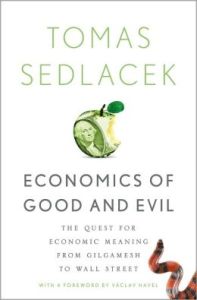Join getAbstract to access the summary!

Join getAbstract to access the summary!
Tomas Sedlacek
Economics of Good and Evil
The Quest for Economic Meaning from Gilgamesh to Wall Street
Oxford UP, 2011
What's inside?
This exploration of the philosophical roots of economics unmasks the ethical choices in this overly quantitative field.
Recommendation
This exploration of the philosophical history of economic analysis illuminates and enlivens the field. Mathematics has reduced economics to formulaic amorality instead of robust debate over what distinguishes the right economic ideas from the wrong ones. Mythical and religious beliefs and the limits of scientific discovery bred many preconceptions that molded the modern economy. Professor Tomas Sedlacek contends persuasively that economists usually do not measure the impact of emotion as a driving force in decision making. He shows why society would benefit from a better understanding of the nonquantitative concepts that historically have characterized economic thought: good and evil. getAbstract recommends this rich, meaty (but not so easy) read to those who know economic concepts and want to balance their mathematical base with a historical review of economics’ roots in philosophy, religion, theology and other fields.
Summary
About the Author
Tomas Sedlacek, a member of the National Economic Council in Prague, lectures at Charles University.

















Comment on this summary